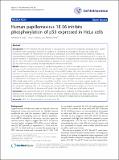| dc.contributor.author | Ajay, Amrendra K | |
| dc.contributor.author | Meena, Avtar S | |
| dc.contributor.author | Bhat, Manoj K | |
| dc.date.accessioned | 2012-07-30T18:15:27Z | |
| dc.date.issued | 2012 | |
| dc.identifier.citation | Ajay, Amrendra K., Avtar S. Meena, and Manoj K. Bhat. 2012. Human papillomavirus 18 E6 inhibits phosphorylation of p53 expressed in HeLa cells. Cell & Bioscience 2: 2. | en_US |
| dc.identifier.issn | 2045-3701 | en_US |
| dc.identifier.uri | http://nrs.harvard.edu/urn-3:HUL.InstRepos:9312981 | |
| dc.description.abstract | Background: In HPV infected cells p53 function is abrogated by E6 and even ectopically expressed p53 is unable to perform tumor suppressor functions. In addition to facilitating its degradation, E6 may also inhibit p53 transactivity, though the mechanisms are still poorly understood. It has been reported that inhibition of p300, an acetyltransferase responsible for p53 acetylation is inactivated by E6. Activation of overexpressed p53 to cause cell growth inhibition is facilitated by its phosphorylation. Previously, we reported that non-genotoxically overexpressed p53 in HeLa cells needs to be phosphorylated to perform its cell growth inhibitory functions. Since over expressed p53 by itself was not activated, we hypothesized an inhibitory role for E6. Results: Majority of reports proposes E6 mediated degradation of p53 as a possible reason for its inactivation. However, results presented here for the first time demonstrate that overexpressed p53 is not directly associated with E6 and therefore free, yet it is not functionally active in HPV positive cells. Also, the stability of overexpressed p53 does not seem to be an issue because inhibition of proteasomal degradation did not increase the half-life of overexpressed p53, which is more than endogenous p53. However, inhibition of proteasomal degradation prevents the degradation of endogenous p53. These findings suggest that overexpressed p53 and endogenous p53 are differentially subjected to proteasomal degradation and the reasons for this discrepancy remain unclear. Our studies demonstrate that p53 over expression has no effect on anchorage independent cell-growth and E6 nullifies its cell growth inhibitory effect. E6 overexpression abrogates OA induced p53 occupancy on the p21 promoter and cell death as well. E6 did not decrease p53 protein but phospho-p53 level was significantly reduced. Conclusion: We report for the first time that E6 de-activates p53 by inhibiting its phosphorylation. This prevents p53 binding to p21 promoter and thereby restraining its cell-growth inhibitory functions. Our study provides new evidence indicating that viral protein E6 inhibits p53 transactivity by mechanism independent of degradation pathway. | en_US |
| dc.language.iso | en_US | en_US |
| dc.publisher | BioMed Central | en_US |
| dc.relation.isversionof | doi:10.1186/2045-3701-2-2 | en_US |
| dc.relation.hasversion | http://www.ncbi.nlm.nih.gov/pmc/articles/PMC3285035/pdf/ | en_US |
| dash.license | LAA | |
| dc.subject | HPV | en_US |
| dc.subject | p53 | en_US |
| dc.subject | phosphorylation | en_US |
| dc.subject | cervical cancer | en_US |
| dc.subject | E6 | en_US |
| dc.title | Human Papillomavirus 18 E6 Inhibits Phosphorylation of p53 Expressed in HeLa Cells | en_US |
| dc.type | Journal Article | en_US |
| dc.description.version | Version of Record | en_US |
| dc.relation.journal | Cell & Bioscience | en_US |
| dash.depositing.author | Ajay, Amrendra K | |
| dc.date.available | 2012-07-30T18:15:27Z | |
| dc.identifier.doi | 10.1186/2045-3701-2-2 | * |
| dash.contributor.affiliated | Ajay, Amrendra | |


